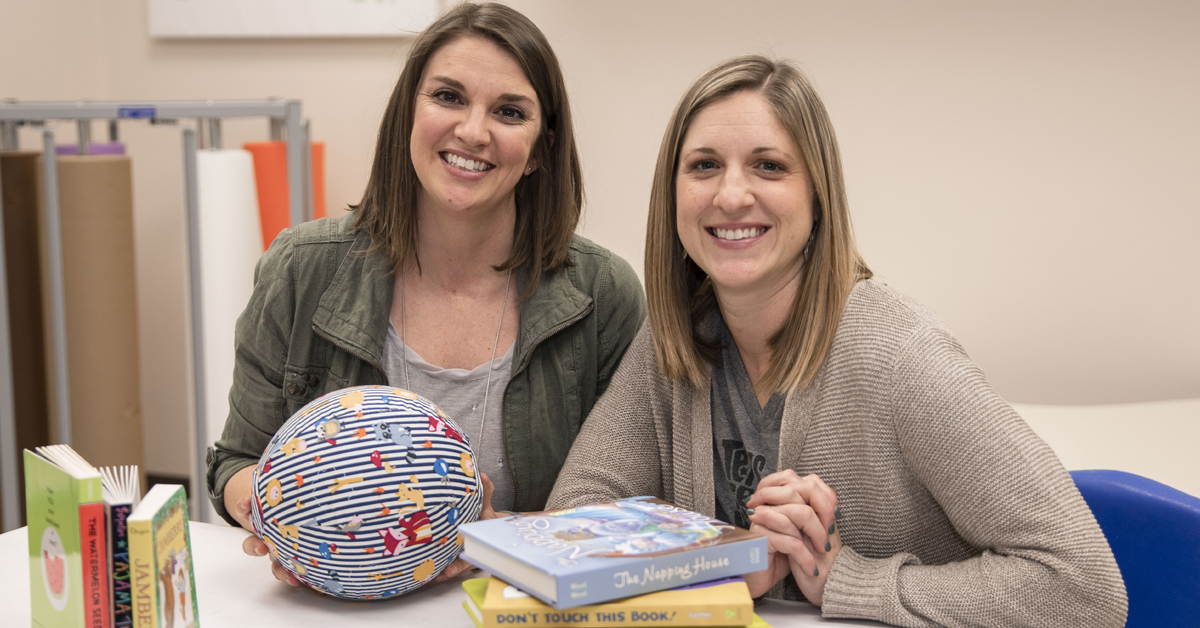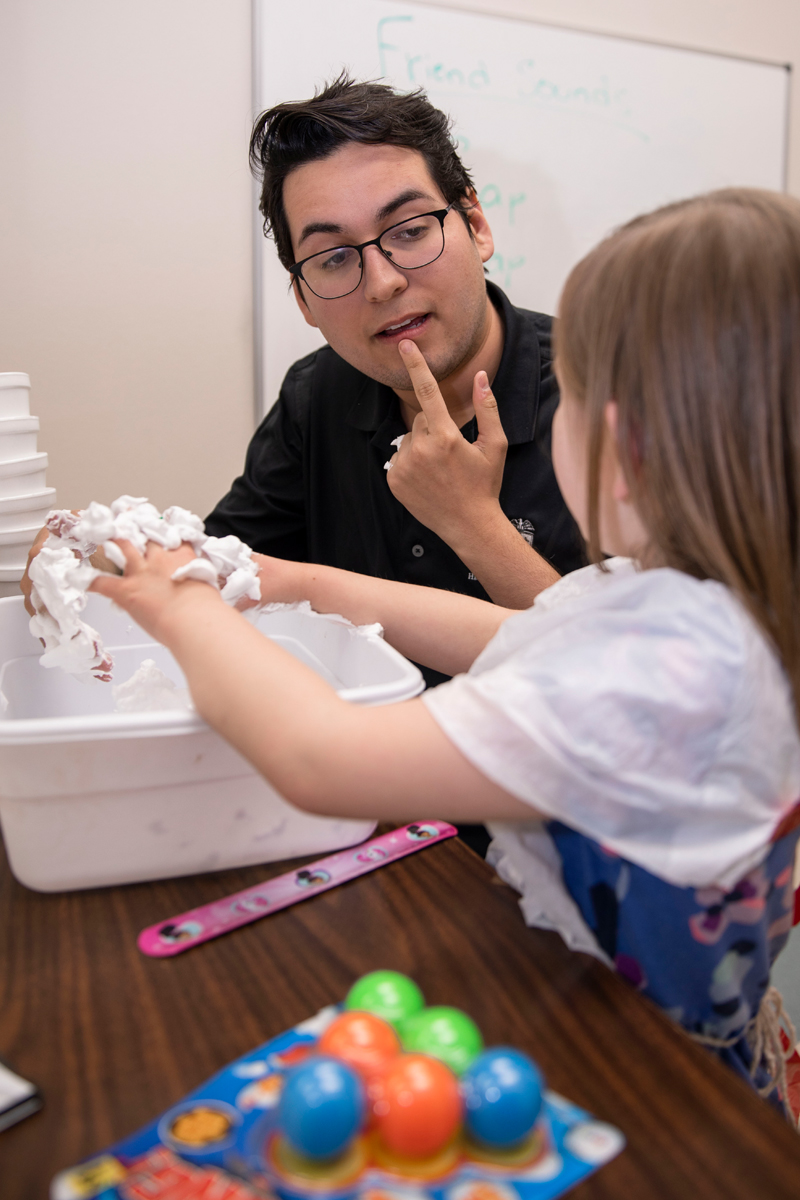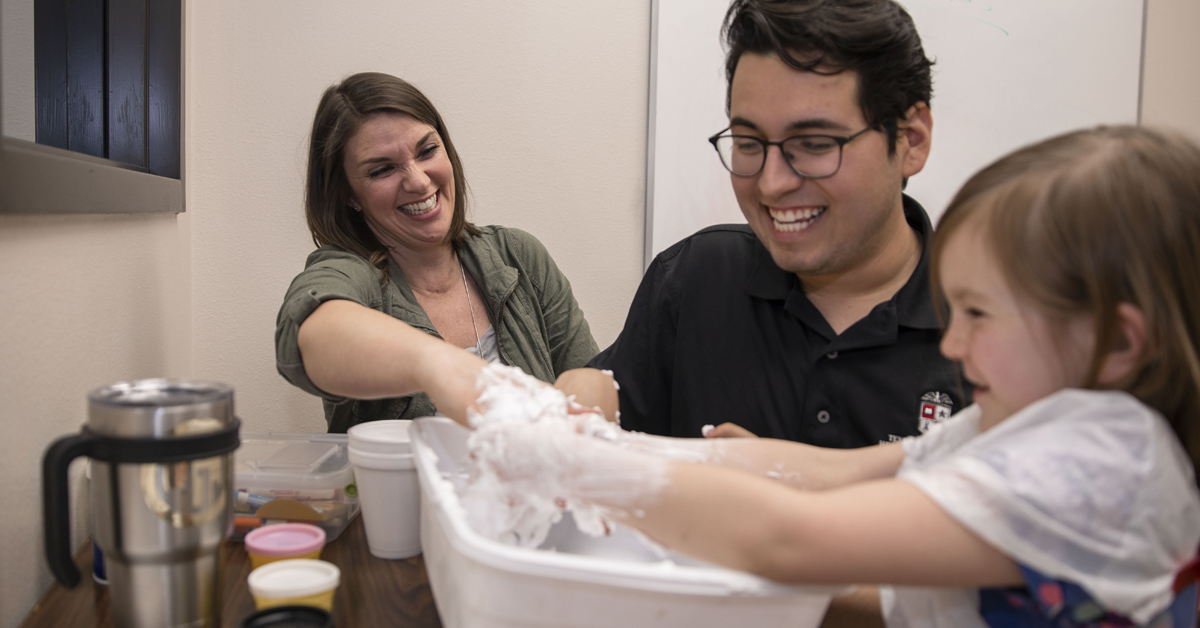What is Speech-Language Pathology?

When students plan their college studies, speech-language pathology is a field that is sometimes overlooked, even though it bundles together some of the most rewarding aspects of several popular career fields. One reason is that students may not always look beyond the immediately familiar career choices.
For instance, a student interested in medicine and the health professions who decides against medical school, might not be aware of the career potential of serving patients and delivering health care in a speech and hearing clinic. Or, students interested in teaching may be visualizing a classroom full of kids who are eager to learn without realizing that speech-language pathology might be an alternative that offers the satisfaction of teaching but in a one-on-one setting. And students interested in becoming a therapist because they want to help people deal with emotional challenges, might not realize that speech-language pathology is a way to do that too.
According to Sherry Sancibrian, BCS-CL, director of TTUHSC’s Master of Science in Speech-Language Pathology, most people are aware the field exists because they’ve known a speech pathologist, but they have little idea of the breadth of services that speech pathologists provide and the range of patients they help.
“Almost always, people either know a speech-language therapist personally — they had one as a neighbor growing up — or they come to know about speech pathology because of a family member who needed our services; perhaps their grandmother had a stroke or they have a sibling with Down syndrome or autism who was helped by a speech pathologist,” she says. Even when a person is aware of the field, they usually are aware of it within the context of their own personal experiences. As a result, Sancibrian points out that often people don’t have a clear impression of what a speech-language pathologist (SLP) does.
So exactly what is speech-language pathology? Let’s start with a definition. The American Speech-Language-Hearing Association (ASHA), the primary speech and hearing science credentialing association in the U.S., defines speech-language pathologists as professionals who “work to prevent, assess, diagnose, and treat speech, language, social communication, cognitive-communication, and swallowing disorders in children and adults.”
That’s a large component of what a speech-language pathologist does, but it is far from the complete picture.
Communication Problems Come in Many Forms
Communication disorders affect all ages and include both developmental communication disorders, which become evident as a child begins to show problems learning to speak, and acquired communication disorders, which are the result of an illness or injury.
Speech-language pathologists who work with children having trouble developing speech can work in schools as well as in health care settings. The students they serve range from children who may need a little help mastering certain sounds to children with severe conditions such as cerebral palsy. Speech-language pathologists often develop long-term relationships with their patients and they work with families as well to help them manage the practical and emotional challenges of living with developmental disorders.
Speech-language pathologists also help people reacquire their speech and language skills after injury or stroke, and they help patients with dementia manage the cognitive issues that affect their ability to communicate. “People don’t know how much we do with cognition,” Sancibrian points out. “We help people with things like memory, attention, problem-solving, and all kinds of thinking skills.”

When a Speech Pathologist Doesn’t Treat Speech
Some of the disorders treated within the field of speech-language pathology don’t actually involve speech. “Swallowing problems are very common for people with health conditions, and if you’re a speech-language pathologist in a health care setting, a large portion of your caseload could be composed of swallowing and feeding problems,” says Sancibrian. Often these are the result of physical injury or a congenital condition. “Someone who has had a stroke is often not able to swallow food. A child who’s born with a cleft palate or cerebral palsy is going to have trouble with feeding.”
Feeding problems treated by a speech pathologist can also include food aversion, an all-too-common challenge faced by parents of young children. When a child’s refusal to eat anything but a few favored processed foods is severe enough to cause a nutritional deficiency, a speech-language pathologist can help the child learn to accept a variety of food textures and flavors.
Social Communication
Speech-language pathologists also help people, especially children, overcome communication problems that involve the ability to recognize and respond appropriately to social cues. This aspect of communication is known in the field as pragmatics.
Communication conventions a speech pathologist can help students or patients improve include becoming comfortable with making eye contact, determining and using the appropriate tone in different situations, improving body language, and reading facial expressions.
The Spoken Word and the Written Word
People are often surprised to learn that an SLP may work in the area of literacy. Difficulty in developing speech often translates into difficulty in learning written communication, so children with untreated speech problems can start school already at a disadvantage.
Brittany Hall, M.S., CCC-SLP, director of TTUHSC’s Bachelor of Science in Speech, Language, and Hearing, stresses the importance of early intervention. “As a speech-language pathologist, one of my biggest points with parents is that we always want to address any speech and language issues early so we can improve academic outcomes. If you don’t have strong oral communication skills, that’s going to carry over to reading and writing.”
Communication Improvement and Vocal Mastery
A speech-language pathologist doesn’t have to work in a school or clinic. Professionals with speech-language degrees are in high demand in other fields, especially in business and the arts. Sancibrian has colleagues who work with managers in large businesses such as IBM to improve their own and their employees’ communication techniques. This might involve helping speakers of other languages modify their accent when speaking English, or it may be teaching people to project their voices powerfully and persuasively when giving presentations. Many speech pathologists in private practice specialize in the treatment of stuttering, which is known as a fluency disorder and is one of the few speech-language areas that offers specialty certification. A speech pathologist can help people overcome this common disorder so it doesn’t needlessly hold them back in their careers.
Additionally, people who use their voices for a living benefit from having a speech-language pathologist to help them improve their vocal quality as well as protect their voices from injury related to overuse. “Some people we see are people who want to go into music or some sort of broadcasting,” says Sancibrian. “And sometimes it’s people who are already in those fields but they use their voices so much they’ve developed voice health issues, like growths on their vocal folds. Bill Clinton had a speech pathologist on staff because he needed therapy so often.”

Speech, Language, and Hearing Science
Speech-language pathology is closely related to hearing science. Some of the coursework required in hearing science degrees overlaps with the coursework in speech-language pathology degrees. In fact, hearing problems diagnosed by an audiologist often lead to the language difficulties that are then addressed by a speech-language pathologist. Ideally, the two can treat patients in tandem. “I think speech-language pathologists and audiologists working together is the preferred practice, but sometimes it’s hard to accomplish because some work settings don’t employ both speech-language pathologists and audiologists,” Sancibrian says. If that’s the case, patients may need to be referred elsewhere to get the full spectrum of treatment. That’s when a practitioner’s interprofessional relationships can play a key role in treatment success for a patient. “You have to get to know your professional community and be able to network,” Sancibrian adds.
Helping People Remotely
Access to health care providers, particularly health care specialists, has always been a challenge for people living in rural communities, but Sancibrian sees technology as a tool for equalizing access to care. “There are definitely medically underserved areas. When your little town has only 1,200 people, there’s probably not going to be a speech-language therapist who lives there. It’s partially solved by home health companies that provide nursing, physical therapy, occupational therapy, speech therapy, and other services, and their staff drive out to peoples’ homes.” But this amounts to a very limited number of specialist appointments compared with people living in metro areas who have access to large health care facilities.
Technology — and an internet connection — can bring care from top facilities right into people’s homes, no matter where they are located. “People with access to a computer can see a speech-language pathologist here at the university and we can do therapy almost like we’re in the same room. We use a system that’s been approved to keep everything confidential. Most of the time we see people at least once face-to-face but the next visits can be done by telepractice.”
Flexible, Portable, Stable
A speech-language degree opens doors to a diverse range of jobs and work environments all over the country. Given that the degree combines many of the satisfactions inherent in three helping professions — health care, education, and counseling — it can lead to a long and rewarding career that allows for personal growth, professional development and commitment to service.
“There are so many opportunities that you will never be bored,” enthuses Sancibrian. “You’ve got the flexibility of working for however long you want in an educational setting, and then you can switch and work in a health care setting. You can work with infants, you can work with children, you can work with adults.” In other words, it’s a career that can move in step with your own developing interests.
With the Bureau of Labor Statistics projecting jobs in speech and hearing science to grow faster than most jobs nationwide, Sancibrian believes that varied opportunities are abundant. “It’s such a great portable job because there will be openings in speech-language pathology wherever you go,” she assures.
As with many of the health professions, job market growth is being fueled in part by a booming senior population. As Sancibrian puts it, “We’ve got that whole group of baby boomers who are getting older and their health is good enough that they’re living longer — but also they’re going to start having some of the problems that come with age, like strokes, swallowing problems, or memory issues.” All these challenges require the expertise a speech-language-pathologist can provide.
And, because health care providers today are better able to diagnose developmental disorders and hearing problems, there’s also a growing need in early education for professionals with speech-language degrees. In addition, school enrollment nationwide is rising, and a larger overall pool of schoolchildren translates into a larger group needing help with speech and language problems.
You Can Get There from Here
The road to a career in speech-language pathology most typically begins with admission to a bachelor’s program in speech, language, and hearing science. The journey culminates with a state license and national certification, both of which require a master’s degree.
If you already have a bachelor’s degree in another academic area, it isn’t too late to get on the track to a career in speech, language, and hearing science. TTUHSC’s Master of Science in Speech-Language Pathology accepts students who have unrelated bachelor’s degrees, as long as they fulfill a number of prerequisite courses. Applicants with bachelor’s degrees in unrelated areas also have the option to enroll in the School of Health Professions’ second degree program, which allows students to complete a bachelor’s degree in speech, language, and hearing sciences in just one year. Admission to the program is very competitive and has both GPA requirements and prerequisite requirements in four areas including physical science, life science, behavioral/social science, and statistics.
The second degree bachelor’s program is an option worth exploring if you have the right academic background. Compared with simply enrolling in prerequisite courses, the second degree bachelor’s option has two big advantages: it fulfills requirements for application to a master’s program and, since it is a degree program, students are more eligible for financial aid and scholarships.
Sancibrian describes the master’s degree classes as diverse and she stresses that career changers are an asset to the program. “Some of our strongest students have come from other fields, and even fields you might not think about in relation to our profession. We’ve had students who have come from a background in business and from dance, and I like that because it increases the diversity and perspectives in our classes.”
Students in the program put into practice the skills they’re learning in the classroom by working in the School of Health Professions’ Speech-Language and Hearing clinic. The clinic serves the local community, and students treat patients under the supervision of faculty. Working in the clinic also gives students a chance to collaborate with classmates and faculty from other health care disciplines, such as occupational therapy, physical therapy, and medicine. “We have a great state-of-the-art facility, and the students and clinicians providing services are utilizing the most recent and advanced research,” says Hall. “For the master’s in speech-language pathology, the goal of the program is to develop truly great clinicians.”
If the variety, flexibility, and portability of a career in speech-language pathology appeal to you, visit the master’s program page for more information on application requirements, deadlines, and to learn more about our curriculum. If you have any questions, you can also email us at health.professions@ttuhsc.edu or call, (806) 743-3220.
Related Stories
Celebrating Veterans: TTUHSC’s General Martin Clay’s Legacy of Service and Leadership
From his initial enlistment in the Army National Guard 36 years ago to his leadership in military and civilian health care management roles, Major General Martin Clay’s career has been shaped by adaptability, mission focus and service to others.
Texas Tech University Health Sciences Center School of Nursing Named Best Accelerated Bachelor of Science in Nursing Program in Texas
The TTUHSC School of Nursing Accelerated Bachelor of Science in Nursing (BSN) program has been ranked the No. 1 accelerated nursing program in Texas by RegisteredNursing.org.
TTUHSC Names New Regional Dean for the School of Nursing
Louise Rice, DNP, RN, has been named regional dean of the TTUHSC School of Nursing on the Amarillo campus.
Recent Stories
The John Wayne Cancer Foundation Surgical Oncology Fellowship Program at Texas Tech University Health Sciences Center Announced
TTUHSC is collaborating with the John Wayne Cancer Foundation and has established the Big Cure Endowment, which supports the university’s efforts to reduce cancer incidence and increase survivability of people in rural and underserved areas.
TTUHSC Receives $1 Million Gift from Amarillo National Bank to Expand and Enhance Pediatric Care in the Panhandle
TTUHSC School of Medicine leaders accepted a $1 million philanthropic gift from Amarillo National Bank on Tuesday (Feb. 10), marking a transformational investment in pediatric care for the Texas Panhandle.
Texas Tech University Health Sciences Center Permian Basin Announces Pediatric Residency Program Gift
TTUHSC Permian Basin, along with the Permian Strategic Partnership and the Scharbauer Foundation, Feb. 5 announced a gift that will fund a new pediatric residency.
